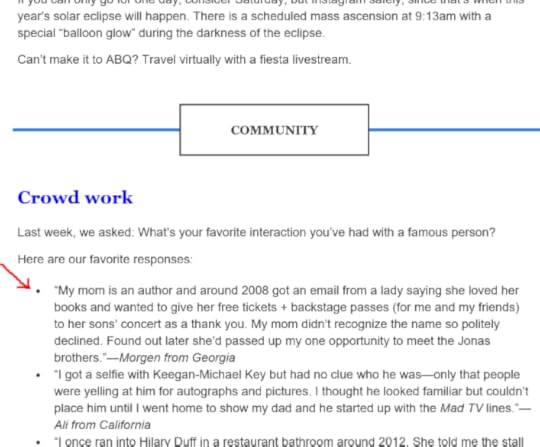Shaunti Feldhahn's Blog, page 8
May 21, 2024
How To Stop Being a Snowplow Parent – Part 2
This is Part 2 of a two-part series for parents who are tempted to do too much for our kids. (Guilty!!) Part 1 covered the importance of recognizing our teens’ desire for freedom and letting them make mistakes. This Part 2 tackles “but what if____” sorts of questions and how to handle the mistakes!
When my friend Lisa Rice and I were doing the research with 3,000 teens for our book For Parents Only and several others, my children were pretty young – but she had four teenagers in her house. And every day, I was amazed at how well Lisa and her late husband Eric allowed them to navigate the bumpy road of adolescence without hovering. With young kids at the time, I was used to constant hovering!
“Be sure to give the teacher your permission slip – if you forget, you won’t be able to go on the field trip.”
“Did you remember your lunch? If you forget, you’ll be hungry.”
“Here, you’ll be cold if you don’t wear your coat.”
By contrast, here’s an example of something I heard from Lisa when her teenage daughter called from school, having forgotten her permission slip: “Oh honey, I’m so sorry to hear that you missed the field trip. You must be so disappointed. No, sorry, I can’t come get you. We’re on a job today so you’ll need to stay at school and just work on homework and come home on the bus at the normal time.”
Guess who never forgot a permission slip again?
Many of us parents don’t realizethe dangers of what developmental experts call “over-involved parenting.” This could include helicopter parenting – trying to swoop in and pluck a child out of a problematic situation. Or it could mean snowplow parenting – trying to prevent problematic situations to begin with.
The problem is, as we said in Part 1, our kids need to be able to make mistakes. In order to become fully functioning, resilient adults they need to experience the bumps, bruises, and disappointments we are trying so hard to prevent.
Now, some of you have probably been sputtering (as I originally was!) “but… but… what if they get hurt? What if they make serious, life-ruining mistakes?” I’m not minimizing those concerns; the “but what if’s” are crucial to consider. Thankfully, in the For Parents Only research, teens had something to say about that too.
So based on the research – and the best advice of developmental experts – here are three more action steps for all of us tempted-to-snowplow parents. (If you missed the first three in Part 1, I encourage you to read that post first.)
Step #4: Walk parallel to them, instead of in frontAs our teens get older, instead of snowplowing the road ahead to avoid potential hurt, experts advise that we walk parallel to our kids. This allows us to keep watch and share wisdom if we think it is needed. But if our child doesn’t heed what we say, it allows them to trip and fall over that obstacle we saw coming, but which they dismissed.
For example, avoid the urge to wake your child up every morning in time for school because they’ll get detention for being late. It’s far better for them to learn the lesson of being late for school now than being late for that job interview.
Or what if they haven’t figured out how to navigate an intimidating obstacle – for example how to talk to their boss at the pizza place about switching their work schedule? Yes, encourage and help them by offering to role-play the conversation, but stay parallel. Don’t step into the actual conversation. That gives them the chance to try their hand at it.
Will they do well at it? Maybe not. Maybe they will fumble and feel embarrassed. Maybe they will even end up with a worse schedule from an impatient boss. But again, better for them to give it a shot, practice when the stakes are low, and position themselves later to think, “I’ve done this before, and I know what to expect next time.”
Full disclosure: I’m really, really not good at this. I’m not good at letting my kids – especially my son, who has epilepsy and some processing issues as a result – fumble and try in this way. I want to prevent the heartaches. But … will I? I have to realize: I’m not actually preventing the heartaches. Rather, I am merely postponing the heartaches until a time when the stakes are much higher—and when I will truly be unable to help.
Step #5: Step in when the obstacle becomes a cliffWe have to be ready to step in with wisdom and direction if our kids (or adult kids) are truly in danger or in over their heads. Walking parallel to our kids in an involved but not over-involved way, allows us to do this. When a child trips and falls because of a pothole in the road, that’s one thing. It’s an entirely different situation when tripping will pitch them over a cliff.
As we’re talking about avoiding snowplow parenting, we’re not talking about letting our kids do whatever they want. Even the teens themselves – on our nationally-representative survey – secretly don’t want that. (For more, see this series, “The Good Thing About Being the Bad Guy.”)
After all, their judgment isn’t always sound – so ours must be. As adolescent psychotherapist Dr. Julie Carbery shared in For Parents Only, the freedom our teens are striving for “[is] intoxicating. It’s addictive … They will do anything to get it, and they are terrified of losing it.”
A teenager “under the influence” of freedom, and whose brain is not fully developed, will sometimes do really stupid things. So allowing unmonitored high-stakes and/or reckless activities that can change the entire course of their lives is in a different category. That is not what we are talking about here.
In addition, we are not saying to never rescue a child. Remember, when the disciple named Peter took a brave step out onto the water and then began to flail, Jesus didn’t hesitate to lift him back to safety.
This leads to our very important next step.
Step #5: When your teens make mistakes (which they will) reassure them of your love and supportWhat our kids need more than our oh-so-efficient snowplowing skill is our unconditional love. One of the most vital findings from the teens in our research was just how easily kids didn’t feel supported when they messed up – and how much that led them to close off their hearts.
When Junior flops his driving test, a sincere “I believe in you” (without mentioning “I told you to practice more”) can restore his confidence. He’s not dumb; he realizes he might need to practice that three-point turn a few more times.
When normally Straight-A Susie copies a friend’s homework because she didn’t get enough sleep after hanging out with friends, you can either chew out the teacher for giving her a zero (not recommended) or you can aim your best affection at your daughter – lovingly telling her you’re sorry for the consequences, but you love her and you’re proud of her for owning up to her mistake.
And what if it is something much more serious? That is when you step up onto the path, take their hand, and walk beside them through every single consequence. One teenager we talked to in the research was arrested with others at a party where drugs and alcohol were present. His parents were angry and upset, and he was feeling defensive and like a failure.
Yet in their anger, he said his father handled it in a way that changed everything. He said his dad came to the jail to pick him up. He told him, “This is going to probably involve some hard consequences. You’ll need to go to court. It will be on your record. You’ll need to do community service. But I want you to know: I love you, and I believe in you, and I will be with you every step of the way.”
This big, stoic teenage boy started tearing up as he told me that story. And candidly, I started tearing up listening to it. But that is what our teens need from us. Yes, when they make mistakes – and they will – they must know they will walk out the consequences. But they also must know that we’re with them through it all. That, in their lexicon, is what speaks unconditional love.
In the end, letting our kids overcome life’s obstacles will help them find their place in this world with greater confidence, self-agency, and resilience.
So let’s take a deep breath, and let them.
And if you are interested in having Shaunti speak on kindness for your workplace, church, school or community group, please contact Nicole Owens at nowens@shaunti.com.
Please note: This post may contain affiliate links. As an Amazon Associate we earn a small amount from qualifying purchases through these affiliate links. This doesn’t cost you anything, and helps us continue bringing you great content!
#mc_embed_signup{background:#fff; clear:left; font:14px Helvetica,Arial,sans-serif; } /* Add your own Mailchimp form style overrides in your site stylesheet or in this style block. We recommend moving this block and the preceding CSS link to the HEAD of your HTML file. */ .button {background-color: #3389C2;background:#3389C2;color: #fff} Receive Shaunti’s Blog & Updates* indicates required Email Address * (function($) {window.fnames = new Array(); window.ftypes = new Array();fnames[0]='EMAIL';ftypes[0]='email';fnames[1]='FNAME';ftypes[1]='text';fnames[2]='LNAME';ftypes[2]='text';fnames[3]='SOURCE';ftypes[3]='text';fnames[4]='MMERGE4';ftypes[4]='text';fnames[5]='MMERGE5';ftypes[5]='date';fnames[6]='MMERGE6';ftypes[6]='text';fnames[7]='MMERGE7';ftypes[7]='text';fnames[8]='MMERGE8';ftypes[8]='text';fnames[9]='MMERGE9';ftypes[9]='text';fnames[10]='MMERGE10';ftypes[10]='phone';}(jQuery));var $mcj = jQuery.noConflict(true);More from Shaunti’s Blog:
 How To Stop Being a Snowplow Parent – Part 2
How To Stop Being a Snowplow Parent – Part 2
 How To Stop Being a Snowplow Parent – Part 1
How To Stop Being a Snowplow Parent – Part 1
 A Mother’s Day Message of Hope
A Mother’s Day Message of Hope
 When You Hear Something that Rocks Your World, 4 Ways to Not Freak Out
When You Hear Something that Rocks Your World, 4 Ways to Not Freak Out
 A Personal Update – Gratitude Edition
A Personal Update – Gratitude Edition
 Why Is It So Hard to Talk About Sex?
Why Is It So Hard to Talk About Sex?The post How To Stop Being a Snowplow Parent – Part 2 appeared first on Shaunti Feldhahn.
May 14, 2024
How To Stop Being a Snowplow Parent – Part 1
his is Part 1 of a two-part series for those of us parents who just love to help our kids – but maybe just a bit too much.
When our kids were young, Jeff and I took them to the Upper Peninsula of Michigan. One of Jeff’s friends has a cabin in the UP, and we drove through a massive snowstorm to get there. Once it cleared, we had so much fun taking our kids snowmobiling.
Jeff and his buddy would often go in front of us to smooth out the extra bumps, which I appreciated! I found it a bit scary to be at the front, with all the extra bumps and risks.
At the end of one day of snowmobiling, the kids wanted to build igloos, since the snow was so deep. Imagine what would have happened if, instead of letting them, we “went in front of them” by jumping in and saying, “We don’t want you packing all that snow because your hands might get cold. Here, let us build the igloos.”
That would be ridiculous.
And yet, as parents, how often do we do exactly that? It’s called snowplow parenting: Smoothing out our children’s paths so that they don’t get bumped and bruised by life.
Snowplow parenting sounds reasonable – and yet it can create serious risks for our kids in ways we don’t even see. Let’s look at how this plays out, first by seeing how big of an issue this is, and then sharing six steps that will help us stop.
What we do for our kids even as adults: some scary dataFirst, let’s look at the natural progression if we snowplow our kids through high school: it doesn’t stop there!
A 2019 New York Times poll surveyed parents with adult children ages 18 to 28. Three-quarters of these parents made appointments like doctor visits or haircuts for their adult children. (Um, guilty! I’m the main contact for the neurologist who treats my college-age son’s epilepsy. And this poll made me realize that I probably shouldn’t be!) Eleven percent said they would contact their child’s employer if their child had an issue.
Earlier this year, Pew Research found that 59% of parents with adult children 18-34 gave financial help to a child in that age range in the last year. Among parents who helped their children financially, 36% said doing so hurt their own personal financial situation at least some. And one of the top areas in which young adults got financial help was cellphone bills and streaming services!
What? Are we really sacrificing our 401(k)s so our adult kids can watch Netflix?
Snowplow parenting can stunt our kids in every area from budgeting and organization to sacrifice and handling conflict. To nip this parenting pitfall before our kids hit adulthood, here are the first three of six helpful steps, based on our research with 3,000 teens for For Parents Only and other books.
Step #1: Give your kids freedom to solve problemsIt’s one thing to try to make things easier for young kids who don’t understand how to do things. The kids appreciate it, just like we appreciated the guys going in front of us with their snowmobiles to smooth out the snow.
It’s another thing to keep trying to smooth their path by solving their problems as they get older. Our goal as parents should be, as the old saying goes, to “prepare the child for the road instead of preparing the road for the child.”
This becomes especially true in the teenage years – which is when our kids naturally are like eager young horses pulling at the bit, raring to race down that road. According to our research for For Parents Only, in response to a question about how eager they were for freedom, 72% of teens surveyed said they felt like they had to have it and were intensely motivated to pursue it.
It is developmentally healthy and appropriate for young people to jump onto that bumpy road as they move toward independence. This means, by definition, that they need to do things without us. Which also means … there will be bumps and bruises.
As parents, we can support them as they navigate bumps in the road without going ahead to clear those bumps out. (Cold hands and igloos!)
Those of us who are boy-moms need to be especially mindful: teen boys have a particularly strong need to feel trusted to solve problems. This matters to girls too, of course. But my For Parents Only found that teen boys especially longed to feel competent, looked up to, and significant. If Mom rushes to the rescue in handling a bully, for example, he will feel powerless instead of empowered. (This might come out in a sullen or withdrawn attitude – a common signal of feeling incapable and disrespected.)
Step #2: Let your kids make mistakesAs parents, none of us wants to see our kids get a zero on a late assignment, get a speeding ticket, or explain to a coach why they don’t have their practice equipment.
And yet, when their grade suffers, when they have to pay for the car insurance spike because of that speeding ticket, or when they get benched, they build resilience muscles! A little bit of pain when the stakes are low helps them learn and grow. In fact, if you think about it, there is no way to build those muscles other than using them.
Take a dad who I’ll call Scott. Scott’s daughter often procrastinated on her college assignments – to the point of him expressing regular frustration and logging into her school portal to prod her to get them done. I wonder if letting her fail a class and have to retake it at her own expense would have gotten the point across in a more powerful way.
Perhaps more important: Kids who aren’t allowed to fail also don’t realize their own sense of agency. They feel at the mercy of a confusing world. Experts (for example, see this article in Parents magazine) have found that snowplow-parented kids give up too easily, have poor problem-solving skills, and develop “learned helplessness.”
Eventually, these kids don’t fail because they don’t even try.
Maybe it’s time to let our kids (and ourselves) fail. I recently heard of a family who has a “Mistake Monday” routine. At dinnertime, they talk about mistakes they made the previous week. They remind each other that it’s okay and emphasize having grace. I love that.
Step #3: Slow our own pace (rather than doing it for them “because it’s quicker”)This final point for this week comes to you deep from the heart of a fellow high-capacity parent. Some of us are in a hurry, and don’t leave “parenting margin” in our lives. So we get annoyed when our kids fail or have a problem that slows us down, because it impacts our schedule too.
Think about it this way. When our child was little, it was indeed faster for us to tie their shoes in the morning. But we knew it was so important for that little mind and those little fingers to try it themselves. So we forced ourselves to let our child fumble and try, even though the clock was ticking. And then perhaps maybe we learned the object lesson that we needed to allow an extra ten minutes in the morning, so that we had time for the fumbling and wouldn’t have to jump in. After all, we know allowing our child to do it on their own is so important and will be much better for them in the end.
It’s the same thing ten years later when that same child is struggling in English class. Instead of hurrying things up by rewriting the paper for them, we need to allow the margin to make suggestions and then let them do the rewriting. Allowing our child to do it on their own will be much better for them in the end.
So, what do you think? If you’re like me, you’ve probably already got a list of “but what about ___!?” questions. Yes, there will be many situations in which our kids aren’t yet ready for full freedom – and yet we still need to back off the temptation to snowplow. We’ll tackle that next week in Part 2.
And if you are interested in having Shaunti speak on kindness for your workplace, church, school or community group, please contact Nicole Owens at nowens@shaunti.com.
Please note: This post may contain affiliate links. As an Amazon Associate we earn a small amount from qualifying purchases through these affiliate links. This doesn’t cost you anything, and helps us continue bringing you great content!
#mc_embed_signup{background:#fff; clear:left; font:14px Helvetica,Arial,sans-serif; } /* Add your own Mailchimp form style overrides in your site stylesheet or in this style block. We recommend moving this block and the preceding CSS link to the HEAD of your HTML file. */ .button {background-color: #3389C2;background:#3389C2;color: #fff} Receive Shaunti’s Blog & Updates* indicates required Email Address * (function($) {window.fnames = new Array(); window.ftypes = new Array();fnames[0]='EMAIL';ftypes[0]='email';fnames[1]='FNAME';ftypes[1]='text';fnames[2]='LNAME';ftypes[2]='text';fnames[3]='SOURCE';ftypes[3]='text';fnames[4]='MMERGE4';ftypes[4]='text';fnames[5]='MMERGE5';ftypes[5]='date';fnames[6]='MMERGE6';ftypes[6]='text';fnames[7]='MMERGE7';ftypes[7]='text';fnames[8]='MMERGE8';ftypes[8]='text';fnames[9]='MMERGE9';ftypes[9]='text';fnames[10]='MMERGE10';ftypes[10]='phone';}(jQuery));var $mcj = jQuery.noConflict(true);More from Shaunti’s Blog:
 How To Stop Being a Snowplow Parent – Part 1
How To Stop Being a Snowplow Parent – Part 1
 A Mother’s Day Message of Hope
A Mother’s Day Message of Hope
 When You Hear Something that Rocks Your World, 4 Ways to Not Freak Out
When You Hear Something that Rocks Your World, 4 Ways to Not Freak Out
 A Personal Update – Gratitude Edition
A Personal Update – Gratitude Edition
 Why Is It So Hard to Talk About Sex?
Why Is It So Hard to Talk About Sex?
 How to Handle Unmet Money Expectations (Part 2)
How to Handle Unmet Money Expectations (Part 2)The post How To Stop Being a Snowplow Parent – Part 1 appeared first on Shaunti Feldhahn.
May 7, 2024
A Mother’s Day Message of Hope
With Mother’s Day coming up, and with my own sweet mom navigating a recent health scare, I’m especially reminded this year that having the love and support of a mom is a big deal – no matter how old we are.
When I was growing up, I watched how my mom dealt with difficulties and challenges (a tragic family death, founding and running a busy non-profit, a brain seizure condition that mimicked depression, and so on), and how hard she tried to cultivate a sense of peace in the storms. In fact, since everyone asks where my name comes from, my parents were Peace Corps volunteers in India before I was born and my name is the Hindi word for “peace.”
It’s a hard name to live up to. Just because I’m named “Peace” doesn’t mean it’s intuitive. None of us are born with a peace gene. But in the last few years, as I’ve been tackling my next research project on mental health, and writing my devotionals, Find Rest, Find Joy and Find Hope, I am growing more focused on how to cultivate true peace and joy regardless of the circumstances around me. As much as I’d like to steer clear of trials, they usually are the instruments God uses to do this work.
Here’s what I’m learning: when we allow trials to do a work in us instead of a number on us, that’s where hope becomes real and alive. (Read Romans 5:3-5 to see how this can be possible!)
This became reality for me recently in the strangest place – a cancer treatment center. I was wearing a flimsy hospital gown, nervous to face the pain of yet another needle biopsy. It was routine – just to check a spot that had a little question mark around it – but is such a thing ever routine?
Still, I decided to steady my mind on how grateful I was for medication to dull the pain, tests to diagnose me, and God’s plans to build character and produce hope in me even in the pain. What a blessing to live in a time when doctors can get such a clear picture of my health (which continues to be fine – the biopsy was clear).
This recent test brought to mind a short piece in my newest book release, a devotional journey called Find Hope. Maybe this idea of giving thanks in all things will meet you where you are today. In fact, maybe this 60-day journey is something you and your mom (or you and your daughter!) could get started on together, just in time for Mother’s Day. Here’s an excerpt:
Day 20Giving Thanks in All ThingsI was lying on the table, trembling. In the months since learning I had breast cancer, I had been poked and prodded more than I thought possible. It was caught early, but still involved many biopsies, treatments, radiation, disruptions to my schedule, and quite a bit of fear. Not so much a fear of dying, but of pain. I am a wimp when it comes to pain and needles. And now pain and needles seemed like an everyday occurrence. Then a routine OB/GYN visit discovered something abnormal. Great. Just great. So there I was on the table, needing another painful biopsy, grappling with fear.
Suddenly the Scripture from my morning devotional came to mind. First Thessalonians 5:16-18 says to give thanks in all circumstances. Which meant I needed to give thanks for this. It completely took me aback as I was waiting for the doctor to walk in. I realized there were actually things to be thankful for.
I had been focused on the pain of the test, but I began telling God, Thank you, God, that this test even exists! Thank You for the medical community’s skill in stopping small problems from becoming big ones. Thanks for being with me. Thanks for drawing me closer to You rather than farther away.
I realized that in challenging times, we usually focus on all the things to not give thanks for, but we can make a conscious choice to turn worry into worship. We can choose to say, yes, the enemy meant this for evil, but God can turn it to good. And one of the greatest “goods” is the precious opportunity to see God come close.
Not long ago, a pastor asked how my health was doing. He said his brother had cancer too – a very serious type. His brother had recently said he was grateful for this time in his life. Shocked, the pastor exclaimed, “But you could die!”
His brother responded, “Sure. But because of going through this, I have seen Jesus so clearly and so closely. I honestly don’t know that I would change it.”
Something miraculous happens when we choose to give thanks in all things. We suddenly see a bigger picture, and it feeds our hope. Even though it’s something we wouldn’t have chosen going in, I agree with that pastor’s brother. I’m not sure I would change a thing.
Final thoughts: Seeing trials as a pathway to peaceFriends, your fears might not grip you on a medical table. Maybe they’re present in relationship stress. Or a financial blow. Or any untold number of other things that threaten our health, stability, or wellbeing. Or, even harder sometimes, the wellbeing of someone we love.
So here are four questions to ask ourselves that might help us see our pain not as yet one more standalone tragedy, but as a pathway to peace:
How can this present challenge help me see Jesus up close?Is there anything in this trial – this circumstance – that I can sincerely “give thanks” for?How have I seen God work in trials in the past, and what does that imply about the future?Looking at those prior painful trials, how far has God brought me in my faith?These are the questions that move us away from hopelessness and toward the life-giving hope that God wants to anchor us in. A hope that doesn’t hinge on outcomes, but hinges on Him.
This is the journey my new devotional Find Hope takes us on. I searched scripture and science and created a 60-day path that combines Biblical wisdom with practical, doable habits that cultivate hope. It is carefully crafted, and the illustrator beautifully designed every page in full color (you have to take a look inside the book). It is a book I’d be so honored to see you put in your own mom’s hands this Sunday for Mother’s Day.
Let me know if you and your mom (or daughter) go through this book together. I’d love to hear your takeaways. And of course, Happy Mother’s Day to all the moms, stepmoms, mom-in-laws, spiritual moms, and grandmas out there. Did I cover everyone? You wear so many hats. Mine is off to you today.
And if you are interested in having Shaunti speak on kindness for your workplace, church, school or community group, please contact Nicole Owens at nowens@shaunti.com.
Please note: This post may contain affiliate links. As an Amazon Associate we earn a small amount from qualifying purchases through these affiliate links. This doesn’t cost you anything, and helps us continue bringing you great content!
#mc_embed_signup{background:#fff; clear:left; font:14px Helvetica,Arial,sans-serif; } /* Add your own Mailchimp form style overrides in your site stylesheet or in this style block. We recommend moving this block and the preceding CSS link to the HEAD of your HTML file. */ .button {background-color: #3389C2;background:#3389C2;color: #fff} Receive Shaunti’s Blog & Updates* indicates required Email Address * (function($) {window.fnames = new Array(); window.ftypes = new Array();fnames[0]='EMAIL';ftypes[0]='email';fnames[1]='FNAME';ftypes[1]='text';fnames[2]='LNAME';ftypes[2]='text';fnames[3]='SOURCE';ftypes[3]='text';fnames[4]='MMERGE4';ftypes[4]='text';fnames[5]='MMERGE5';ftypes[5]='date';fnames[6]='MMERGE6';ftypes[6]='text';fnames[7]='MMERGE7';ftypes[7]='text';fnames[8]='MMERGE8';ftypes[8]='text';fnames[9]='MMERGE9';ftypes[9]='text';fnames[10]='MMERGE10';ftypes[10]='phone';}(jQuery));var $mcj = jQuery.noConflict(true);More from Shaunti’s Blog:
 A Mother’s Day Message of Hope
A Mother’s Day Message of Hope
 When You Hear Something that Rocks Your World, 4 Ways to Not Freak Out
When You Hear Something that Rocks Your World, 4 Ways to Not Freak Out
 A Personal Update – Gratitude Edition
A Personal Update – Gratitude Edition
 Why Is It So Hard to Talk About Sex?
Why Is It So Hard to Talk About Sex?
 How to Handle Unmet Money Expectations (Part 2)
How to Handle Unmet Money Expectations (Part 2)
 How to Handle Unmet Money Expectations (Part 1)
How to Handle Unmet Money Expectations (Part 1)The post A Mother’s Day Message of Hope appeared first on Shaunti Feldhahn.
May 2, 2024
When You Hear Something that Rocks Your World, 4 Ways to Not Freak Out
There’s lots to freak out about right now isn’t there? From our kids’ choices and business pressures to policy issues we are passionate about, there’s always something. And those “somethings” are often very real concerns.
Yet the bigger concern is one we often don’t see: Are we making things worse, in our mind and heart, by losing perspective? In other words: Are we making things worse by freaking out?
I recently shared a meal with someone who was getting more and more agitated as she described an issue she cares about. A LOT. It is an extremely important issue, and she is doing great things in working with it. But I also notice there’s a lot of tension in her mind and heart these days. It has impacted her relationships with people who love her but may disagree with her. She seems to have slipped from caring about an important issue to being trapped by it.
And I hate to admit this, but as I looked at her that day, I (internally) got a bit judgy. The poor thing just needs to take a deep breath. But then something crazy happened: I felt like God gently challenged me: You do the exact same thing, you know.
Ouch.
My mind quickly scrolled through memories of that business setback that sent me into so much worryabout our finances. And that season I couldn’t stop myself from reading about a particular situation. And the hours and hours I have lost mentally crafting the perfect response to a difficult person. In every single one of those situations I lost perspective, was freaking out, and it was hurting my heart.
We all do this. In many, many different ways.
So, how can we not do this? How can we cultivate a healthy response when we hear something that rocks our world? In future months, we will dive into this topic a bit more, but for now, here are four starting-point methods to not freak out.
Method #1: Guard Your Heart and AffectionsWe lock our cars when we go to the mall. We want to know security measures are in place at sporting events. From the youngest ages, we even had diaries with little locks on them, signifying that our most personal thoughts are worth protecting.
So why in the world wouldn’t we guard the source of those thoughts? Scripture has something pretty definitive to say about this:
“More than anything you do, protect your mind, for life flows from it.”
Proverbs 4:23 (CEB)
More than anything you do.
This sounds pretty important in the eyes of King Solomon, who scripture calls the wisest man ever to live. Thousands of years later, how can we live this out in our own century and culture? That leads to Method #2.
Method #2: Take responsibility for your mental dietHave you ever had one of those days where you raided the pantry or vending machine one too many times? You were in back-to-back meetings and you ate junk food all day. Or you had uncontrollable munchies and, well, that 12-count variety pack of chips you bought for school lunches? Let’s just say there were no survivors.
I’ve been there. And too much junk food eventually makes us feel like garbage.
Our minds are like that too. What we allow into our minds is essentially our thought-life diet – with potentially negative and positive outcomes.
If we stay up late doomscrolling, guess what? We’re likely to feel a sense of doom! Cue the freak-out the next time we see that that BIG POLICY ISSUE is going the wrong way! We can be passionate, yes, active, yes, but studies demonstrate the detrimental health effects of “ingesting” so much concerning content – especially the news programs that amp us up with anxiety.
By contrast, guess what happens if we purposefully put something life-giving into our mind – like reading the Bible before bed? Even secular studies have found that biblical reading establishes a greater sense of hope in our lives.
Or, let’s look at a totally different topic. Are you dissatisfied with your intimate relationship with your spouse, perhaps in part because you keep watching or reading those steamy sex scenes? What might happen instead if you replace those inputs with something that honors your marriage? For example, perhaps you and your spouse watch a clean comedian together and laugh your heads off!
It shouldn’t be surprising that a steady diet of negative input can make us exhausted, nervous, jealous, critical, and paranoid. The problem is: we often don’t even realize WE are the ones fueling this freak-out cycle.
So here’s a practical suggestion: Keep a journal of your “mental diet” for a whole week. Note the time spent on social media and news sites. Record titles of movies and articles. Where might you need to reduce or eliminate intake of toxic, negative voices in your life? And what uplifting content do you need to add to your mental diet?
Method #3: Tune out the TrollsYears ago I wrote a point-counterpoint syndicated newspaper column. (Back when newspapers existed! Remember those?) It was a spirited weekly debate between me – a Christian wife and mom – and my single, progressive, agnostic counterpart.
I took a lot of hits in those days. Some critics were so mad at my Christian-oriented views that they attacked me personally. It. Was. Brutal. My concentration was on the trolls, not on my book deadlines, my kids, or the friendships I could have been enjoying. I constantly found myself checking what was coming in. I was constantly wondering, “What are they saying now?”
Thankfully, my husband Jeff saw the major freak-out in progress. He saw how it was hurting my heart. He stepped in and asked me to trust him to read all the emails and comments instead of me. He would take all that flak, and share something only if he thought I really needed to know it.
His protection allowed me to step back and learn something that Nehemiah in the Old Testament learned, too: it is a trap to engage with toxic critics who are not looking to engage in good faith. I learned that I could (and should) listen to sincere questions and respectful critics, absorb necessary lessons, and change my opinions and practices where needed. But I couldn’t remain productive in my calling if I kept absorbing a steady diet of toxic criticism.
This is so crucial for all of us. If someone on your social media feed is mostly just looking to stir the pot, don’t fall into that trap. Take the ten minutes you would have spent responding – and the hours of back-and-forthing that that might lead to! – and stay laser focused on what God has called you to do.
Allowing the angry opinions of others to steal our hope (and stimulate a freak-out) distracts us from the very good work God is calling each of us to do.
Method #4: Nurture your New NatureWho hasn’t woken up at 3 a.m. with anxious thoughts? Will we run out of money before we run out of month? Will insurance cover the expensive medication my child needs? Will the call-back test reveal a serious health problem?
But as Christians we have a new nature. And it’s not characterized by anxiousness.
In fact, God tells us what grows as we cultivate our new nature: love, joy, peace, patience, kindness, goodness, faithfulness, gentleness, and self-control. Anxious thoughts at 3 a.m. are characteristics of the old nature. Peace and faithfulness are characteristics of the new.
Easy to say, right? In fact, before you start sending fiery emails that I’m going to have to let Jeff read first (kidding!), let me say I know how hard this is. I have a son whose epilepsy rocked our worlds. I’ve gone through cancer. I’ve had more ups and downs in my career than I could count.
So, what’s the trick?
Our old nature has to die. And for that to happen, we have to stop feeding it. We have to stop putting our hope in ourselves to work things out. We have to train our minds to trust God instead. When we do, when we put our full faith in Him, we starve the fear that He won’t come through.
Several of the steps in today’s blog are actually themes I develop at greater length in my new devotional, Find Hope. The book is a carefully crafted 60-day journey designed to lead us toward the kind of unshakeable hope that doesn’t depend on circumstances. I’d be so honored if you ordered it for Mother’s Day. I’m excited to share a full devotion from the book with you next week.
In the meantime, last week I promised a blog on parenting! I didn’t forget. It’s just that as I got into the topic, I liked it so much that I turned it into a two-part series. So, stay tuned for that at the end of this month – just in time to help us navigate summer vacation with our kids!
And if you are interested in having Shaunti speak on kindness for your workplace, church, school or community group, please contact Nicole Owens at nowens@shaunti.com.
Please note: This post may contain affiliate links. As an Amazon Associate we earn a small amount from qualifying purchases through these affiliate links. This doesn’t cost you anything, and helps us continue bringing you great content!
#mc_embed_signup{background:#fff; clear:left; font:14px Helvetica,Arial,sans-serif; } /* Add your own Mailchimp form style overrides in your site stylesheet or in this style block. We recommend moving this block and the preceding CSS link to the HEAD of your HTML file. */ .button {background-color: #3389C2;background:#3389C2;color: #fff} Receive Shaunti’s Blog & Updates* indicates required Email Address * (function($) {window.fnames = new Array(); window.ftypes = new Array();fnames[0]='EMAIL';ftypes[0]='email';fnames[1]='FNAME';ftypes[1]='text';fnames[2]='LNAME';ftypes[2]='text';fnames[3]='SOURCE';ftypes[3]='text';fnames[4]='MMERGE4';ftypes[4]='text';fnames[5]='MMERGE5';ftypes[5]='date';fnames[6]='MMERGE6';ftypes[6]='text';fnames[7]='MMERGE7';ftypes[7]='text';fnames[8]='MMERGE8';ftypes[8]='text';fnames[9]='MMERGE9';ftypes[9]='text';fnames[10]='MMERGE10';ftypes[10]='phone';}(jQuery));var $mcj = jQuery.noConflict(true);More from Shaunti’s Blog:
 When You Hear Something that Rocks Your World, 4 Ways to Not Freak Out
When You Hear Something that Rocks Your World, 4 Ways to Not Freak Out
 A Personal Update – Gratitude Edition
A Personal Update – Gratitude Edition
 Why Is It So Hard to Talk About Sex?
Why Is It So Hard to Talk About Sex?
 How to Handle Unmet Money Expectations (Part 2)
How to Handle Unmet Money Expectations (Part 2)
 How to Handle Unmet Money Expectations (Part 1)
How to Handle Unmet Money Expectations (Part 1)
 How to Live With Unshakeable Hope
How to Live With Unshakeable HopeThe post When You Hear Something that Rocks Your World, 4 Ways to Not Freak Out appeared first on Shaunti Feldhahn.
April 23, 2024
A Personal Update – Gratitude Edition
Multiple times recently, some of you have made me cry – in a really good way. I realize I need to pause my pattern of equipping you with blogs for one week, and acknowledge how you also equip me! So, this week, I want to thank you and share a personal update.
Probably five or six times in the last two months I’ve been at events, business meetings, or on a research trip, and have run across blog readers I have never met before, but who said something like this:
“How are you doing? How is your health journey? I prayed for you during the cancer recovery, and you’re still on my prayer list with everything you’re doing.”
It just … makes me tear up. It is so, so humbling to know that people I have never met are coming before the Lord of Hosts with these requests. Thank you. In addition, I know some of you do not consider yourselves people of faith, and I’m also so grateful for your support, your kind words, and your respect of the faith beliefs that do matter to me and many regular readers.
So here’s a quick update on my personal health, our family, and my latest research project (note one BIG prayer request there!).
Update #1: My personal healthThe breast cancer journey has been a roller coaster, but nowhere near what many other women have to walk through. I’m grateful to report that three years along, each scan and blood panel has ultimately been clear. One of the reasons for that (as some of you know who have been down this road before me) is the post-surgery protocol of taking a daily cancer therapy drug. Yet that drug comes with health impacts of its own.
A bit of background, for the curious: In roughly 80% of women with breast cancer, the cancer is fueled by estrogen. So, in addition to surgery, radiation and/or chemo many of us take an estrogen blocker for 5+ years to try to stop whatever was fueling the cancer to begin with. That is one of the reasons for the dramatic improvements in breast cancer prognosis over the years. In my case, for example, my oncologist said I had a roughly 13% chance of a different cancer arising in the future, but taking the daily therapy drug would cut that risk in half.
The issue is that it can create a host of potential side effects; so there are trade-offs. No surprise that an estrogen blocker might wreak havoc on the female body, right?
My list of health issues CAUSED by this drug is growing, but I’m grateful I can tolerate it enough to keep taking it. One of my author-speaker friends had to discontinue taking this same drug because it was causing her to lose her eyesight (!). My issues (things like having developed an auto-immune disorder) are nowhere near that extreme. Bottom line: I so deeply appreciate your prayers, and I’m praying for those of you who are walking this journey as well.
Update #2: Family and kidsJeff and I realized we were full-blown empty-nesters when our youngest (Luke) was studying for college mid-terms in late March and our oldest (Morgen) texted us from her first full-time job and said, essentially, “I’m filling out my 2023 taxes and … I’m not a dependent anymore, right?”
Right. Wait … right?! How did that happen? We’ve launched an independent adult!
And empty nesting has been fun. Jeff and I have been enjoying being able to speak at marriage events or retreats without the anxiety about whether the return flight will land in time for the volleyball tournament or the big STEM program. And it is cool to get reacquainted as spouses, rather than just as parents who are also spouses.
With our new-found extra hours, we are both working on some new business and ministry efforts. Jeff is doing a lot of legal work for a major Christian foundation these days and working on an entrepreneurial tech venture, and I’m tackling the next research project (see below!) and another big effort that I’ll announce in due course.
Update #3: ResearchOn the research front, I am part of a much bigger initiative than I’ve ever plugged into before. It’s big. Like really big. Because it involves a possible and powerful solution to the mental health crisis in America.
The church.
I have been part of helping to develop a major national initiative — with a major funding source already in place — that could change the entire narrative on the mental health crisis in America. It’s exciting to be a ground-level part of this important work.
I am also working on my own specific research that will help and support this groundbreaking national work. My hope is that it will result in two research studies and books:
A book based on a research study of existing models of mental health care in the church, as well as what church leaders see as the key obstacles, opportunities, and solutions for addressing mental health. Our hope is that tens of thousands of church leaders will catch a vision for how they can step into this space.A book for everyday people like you and me that answers this question: What are the little things that make a big difference when it comes to our own mental health? What are the research-based transformative habits that led real-life people who have suffered from mental health issues to emerge from that, thriving in their mental and emotional health?Of course, big projects always require big funding. Major funding is already in place for the broader, national initiative. IF you feel led to pray I would love your prayers for funding for my two specific research projects outlined above.
We are praying for one or more major donors who intimately understand the need for this important mental health research and feel led to invest in this way. I am not someone who runs in those circles (!) so my team and I are trusting God to make miraculous connections. He’s good at that!
Solutions for the mental health crisis are so needed, and I’m so thrilled to see what is coming together. I’ll explain more about the research and books as details unfold.
Whether it’s tending to our physical or emotional health, filling an empty nest with exciting new plans, or matching donors with good work, He is always on the move. Your personal notes and conversations at conferences are evidence of this to me, too.
I’m honored to be on the ride along with you. And I’ll be back next week with a blog designed to equip parents do this parenting thing with grace, restraint, and a little bit of much-needed humor.
And if you are interested in having Shaunti speak on kindness for your workplace, church, school or community group, please contact Nicole Owens at nowens@shaunti.com.
Please note: This post may contain affiliate links. As an Amazon Associate we earn a small amount from qualifying purchases through these affiliate links. This doesn’t cost you anything, and helps us continue bringing you great content!
#mc_embed_signup{background:#fff; clear:left; font:14px Helvetica,Arial,sans-serif; } /* Add your own Mailchimp form style overrides in your site stylesheet or in this style block. We recommend moving this block and the preceding CSS link to the HEAD of your HTML file. */ .button {background-color: #3389C2;background:#3389C2;color: #fff} Receive Shaunti’s Blog & Updates* indicates required Email Address * (function($) {window.fnames = new Array(); window.ftypes = new Array();fnames[0]='EMAIL';ftypes[0]='email';fnames[1]='FNAME';ftypes[1]='text';fnames[2]='LNAME';ftypes[2]='text';fnames[3]='SOURCE';ftypes[3]='text';fnames[4]='MMERGE4';ftypes[4]='text';fnames[5]='MMERGE5';ftypes[5]='date';fnames[6]='MMERGE6';ftypes[6]='text';fnames[7]='MMERGE7';ftypes[7]='text';fnames[8]='MMERGE8';ftypes[8]='text';fnames[9]='MMERGE9';ftypes[9]='text';fnames[10]='MMERGE10';ftypes[10]='phone';}(jQuery));var $mcj = jQuery.noConflict(true);More from Shaunti’s Blog:
 A Personal Update – Gratitude Edition
A Personal Update – Gratitude Edition
 Why Is It So Hard to Talk About Sex?
Why Is It So Hard to Talk About Sex?
 How to Handle Unmet Money Expectations (Part 2)
How to Handle Unmet Money Expectations (Part 2)
 How to Handle Unmet Money Expectations (Part 1)
How to Handle Unmet Money Expectations (Part 1)
 How to Live With Unshakeable Hope
How to Live With Unshakeable Hope
 What I’m Loving Lately—March 2024 Edition
What I’m Loving Lately—March 2024 EditionThe post A Personal Update – Gratitude Edition appeared first on Shaunti Feldhahn.
April 16, 2024
Why Is It So Hard to Talk About Sex?
Let’s be honest: Conversations (or blogs!) about sex can seem embarrassing or vulnerable. And yet, for married couples, our research has found that talking about sex clearly matters.
In fact, in the largest nationally representative study ever conducted with married couples about sex – which grew into a book I coauthored with Dr. Michael Sytsma called Secrets of Sex & Marriage – we found that a full 73% of couples don’t talk about sex well, Mostly because it’s too awkward or difficult. But our research confirms that couples who do communicate openly about sex are measurably happier in their marriages (in fact 89% are in the highest rungs of marital happiness.)
Let me say that again: couples who can learn to communicate about sexual intimacy are far more likely to be happy in their marriage.
Consider this all-too-common-scenario between a representative couple I’ll call Brad and Susan. Brad slides into bed and begins to rub his wife’s back. He’s been feeling disconnected from her and hopes to bridge the gap between them with physical intimacy. Susan pulls away, her utter exhaustion winning out over concern about any rejection he may feel. Plus … had he even asked about her day?
His heart sinks with disappointment. She feels emotionally lonely. And their distance deepens.
No words are spoken. But plenty is said.
So what’s clogging up our communication on this topic? Here are three research-based reasons we steer clear of talking about sex – and ideas for eliminating the roadblocks.
Reason #1: It’s just so…awkward.Maybe you didn’t have good guidance about sex when you were growing up. I can’t tell you the number of people in our interviews who said something along the lines of, “My parents just avoided the entire subject.” If your family felt awkward talking about sex, it is not surprising that you would have some awkwardness talking about it too. Thankfully, as you’ll see below, that doesn’t have to be the end of the story.
Or maybe your family was able to talk about the topic just fine – but your experience of intimacy in your marriage really doesn’t line up with your expectations based on steamy movie scenes. So you conclude there’s something wrong with you or your spouse. And it just feels too vulnerable or embarrassing to bring up the topic.
What to do: Approach your spouse with curiosity – about them, not just about sex.Remember when you were a kid and you had a playful, curious mindset as you looked at people and the world? What if you approached your spouse that way? Think about it as being curious about how your spouse thinks and feels, rather than about something that might feel a bit more embarrassing (like sexual practices).
Take Brad and Susan for example. What if the next morning (not in the bedroom) Susan were to ask Brad something like, “I felt like we hadn’t talked in a while and it surprised me when you wanted to connect. I’d love to hear what was in your mind – other than the obvious! What was the reason you wanted to be together?” Perhaps Dave could think about it and explain that sex, for him, makes him feel closer to Susan, and that closeness is what he was trying to create.
That relaxed and curious attitude will then truly help with the next step in communication, which is to talk about sex itself. A few tips:
Put on your detective hat to discover what is pleasing to your spouse – including what may have changed over time. It is a direct way of saying, “I care about you.”Be curious about your partner’s body. Being respectfully curious during intimacy allows for more playful and satisfying sex. Plus, the intensely personal nature of sexual curiosity can also foster a sense of safety in the relationship.Push through the awkwardness and just talk about it in whatever way that you can. To the degree that you can begin to talk, you’ll feel more comfortable with the topic. It’s like building a skill: repetition helps.One way to comfortably talk about sex and about your spouse’s thoughts and feelings is to read a book together on the topic. Dr. Sytsma and I designed and wrote Secrets of Sex & Marriage as a book a couple could comfortably read together. Consider even reading out loud to one another, and stopping regularly to ask things like, “Is this true of you?”
Using a book as a starting point is a fantastic, simple way to get you talking and sharing.
Reason #2: We feel like our situation isn’t “normal.”When Jeff and I speak at marriage events, worried couples often seek advice about problems in the bedroom. Although we do not address technical difficulties, we can wholeheartedly reassure them that they are not alone. In fact, almost all couples have at least one significant “issue” in the bedroom. You should see the lightbulbs go on! Hearing that many other couples struggle in the same way melts their fears and gives them courage to find a solution.
Here’s the short version of what we’ve shared with many couples at events: we have to realize that feeling like our sex life isn’t “normal” is normal! What gets us into trouble is when we retreat and become isolated. Then we spiral and falsely believe we’re the only couple on planet Earth having the issues we’re having, when in fact millions of people probably navigate the same issues we’re experiencing.
It will help to expand our view of “normal” and realize that the nuances of desire, frequency, and bedroom habits are unique to each couple. (Dr. Systma and I look into these in statistical detail in chapter 2 of Secrets of Sex & Marriage.)
Instead of worrying about what is normal, focus instead on communicating about your thoughts, feelings and what matters for each of you. This will allow you to build patterns that work best for the two of you.
Reason #3: I don’t want to hurt my spouse’s feelingsEach of us cares deeply about our spouse – and we know that raising sexual issues can be a very tender topic. It can be easier to decide, “I wish he/she knew __________, but it’s not worth it to hurt his/her feelings.”
But avoiding the topic for the sake of not hurting your spouse may also be hurting your spouse! Back to our example of Brad and Susan. Building communication about what was causing the hurt and distance could have helped solve it! Even better, over time, it would prevent it. Brad could have explained his hope that sexual intimacy would draw them close. Susan could have conveyed she was just plain exhausted but maybe they could get the kids to bed early the next night and make time for both emotional and sexual intimacy.
What to do: Make time – at the right time – to talk about sex.Each of us needs to make time to talk about this topic – again, at some point outside the bedroom! And just as important as making time to talk, is finding the right time to talk. Talking about sex frequency may not go well when you’re in bed and discovering that your spouse isn’t “in the mood” or that you’re feeling defensive.
So rather than waiting until bedtime, hit the back patio or go for a walk to talk about this sacred part of your relationship. Just make sure you’re bringing the subject up when you both agree that the timing is right.
Openly talking to your spouse about your thoughts and feelings around sex can help launch you into the highly happy category of marriage.
And here’s one reason why: If you are willing to communicate openly with one another, and are intent on listening well and sharing honestly, you will probably even get to issues under the surface that have nothing to do with sex. As you gently honor one another’s vulnerability in discussing this intimate part of marriage, you and your spouse can progress in the journey toward a deeply fulfilling marriage.
And if you are interested in having Shaunti speak on kindness for your workplace, church, school or community group, please contact Nicole Owens at nowens@shaunti.com.
Please note: This post may contain affiliate links. As an Amazon Associate we earn a small amount from qualifying purchases through these affiliate links. This doesn’t cost you anything, and helps us continue bringing you great content!
#mc_embed_signup{background:#fff; clear:left; font:14px Helvetica,Arial,sans-serif; } /* Add your own Mailchimp form style overrides in your site stylesheet or in this style block. We recommend moving this block and the preceding CSS link to the HEAD of your HTML file. */ .button {background-color: #3389C2;background:#3389C2;color: #fff} Receive Shaunti’s Blog & Updates* indicates required Email Address * (function($) {window.fnames = new Array(); window.ftypes = new Array();fnames[0]='EMAIL';ftypes[0]='email';fnames[1]='FNAME';ftypes[1]='text';fnames[2]='LNAME';ftypes[2]='text';fnames[3]='SOURCE';ftypes[3]='text';fnames[4]='MMERGE4';ftypes[4]='text';fnames[5]='MMERGE5';ftypes[5]='date';fnames[6]='MMERGE6';ftypes[6]='text';fnames[7]='MMERGE7';ftypes[7]='text';fnames[8]='MMERGE8';ftypes[8]='text';fnames[9]='MMERGE9';ftypes[9]='text';fnames[10]='MMERGE10';ftypes[10]='phone';}(jQuery));var $mcj = jQuery.noConflict(true);More from Shaunti’s Blog:
 Why Is It So Hard to Talk About Sex?
Why Is It So Hard to Talk About Sex?
 How to Handle Unmet Money Expectations (Part 2)
How to Handle Unmet Money Expectations (Part 2)
 How to Handle Unmet Money Expectations (Part 1)
How to Handle Unmet Money Expectations (Part 1)
 How to Live With Unshakeable Hope
How to Live With Unshakeable Hope
 What I’m Loving Lately—March 2024 Edition
What I’m Loving Lately—March 2024 Edition
 Finding Contentment in the Everyday: Embracing the Lost Art of Doing Nothing
Finding Contentment in the Everyday: Embracing the Lost Art of Doing NothingThe post Why Is It So Hard to Talk About Sex? appeared first on Shaunti Feldhahn.
April 9, 2024
How to Handle Unmet Money Expectations (Part 2)
This is the second part of a two-part series on money and expectations. See Part 1 for important tips on how to communicate in a fundamentally better way about expectations and values around money.
Money. Conflict. Those two words are paired a lot more often than most of us would like, right? Well, it doesn’t have to be that way! Let’s continue our case study of Amanda and Joseph and his infamous VR gaming set purchase that collided with her saving and timing goals. (If you didn’t catch Part 1, you’ll want to briefly read it to familiarize yourself with our case study.)
Here are the final three action steps, to help you turn money from being an opportunity for conflict into being an opportunity for connection.
Action #3: Work together to align your expectations.In Part 1, we looked at ways to investigate the issue under the issue and specifically talk about those things. If they had done so, Amanda and Joseph might have ended up saying things like:
Her: “I didn’t realize how much this helps you decompress, or that you had been wanting this for months, or that you viewed it as a big part of our entertainment plan going forward.”
Him: “I didn’t realize you were concerned that I might get into a pattern of taking advantage of you financially, instead of standing on my own two feet and making it work.”
And once we do look at the issue under the issue, we can explain what matters most to each of us. For example:
Her: “I can see why you felt strongly about buying the VR set. And I love the idea of the game you bought for me. But just so you know, I really place more value on being able to go out to eat together without feeling like I always have to pay.”
Him: “I can see why you felt strongly about me saving. And I am already planning for the process of building up enough for the most important purchases ahead – and also to take you out to dinner rather than the other way around. But just so you know, I really value being able to make certain purchases when I have the money to do so.”
Perhaps Amanda and Joseph might conclude that – once they are married and are actually sharing money – there’s a way to do what matters to both of them. For example, they might decide to work together to build up two months’ worth of untouchable emergency savings (so she doesn’t feel stressed), and once that happens, they can relax and allow him the flexibility to purchase certain things when they have the cash flow (so he doesn’t feel deprived).
Action #4: Set aside two “buckets” of money so that each spouse can indulge their own expectations.One of the most fascinating findings from the Thriving in Love & Money research was the importance of jointly designating a monthly amount that each spouse can use in whatever way they want, no questions asked. Couples who did that were far happier in their relationship.
In the case we’ve been discussing, this would give Joseph the flexibility to buy certain things when he wants to, and it would give Amanda the ability to pay off her car earlier, or stash extra away in an emergency savings account.
It would, in other words, give each of them the opportunity to indulge their own expectations, without getting hung up on the other person’s.
There is no “one right way” to manage money, which is why our money expectations are often so different. But because money gets at many issues of the heart – what we value, why we view competing priorities the way we do, what are our fears and dreams – it is a great opportunity for connection at a heart level. As long as we expect the differences and communicate about the matters of the heart, money can truly change to being a source of intimacy in our marriage.
Action #5: Maintain a team attitude.While Amanda and Joseph aren’t yet married, they are headed in that direction. And when we say, “I do,” we become a team. We are still individuals with different backgrounds, spending habits, and our own “wants” – but our own “wants” can no longer rule the day. We have to counter our innate tendency to be self-serving and create a team mindset.
In our research for Thriving in Love & Money we heard from a lot of couples who had figured out that one great way to function as a team was to literally have a “huddle” on a regular basis – maybe a few minutes each week, or one evening a month – to discuss the time ahead and any money issues to resolve. Others shared the benefit of praying together around finances.
Still others emphasized that being a team means being willing to look at where we ourselves are not being a team player – for example, asking ourselves tough questions like, “Am I defending my discretionary purchases while being critical of my spouse’s?”
Ouch. I know.
But if we’re willing to work toward being a team in that way – and via the other steps outlined in last week’s blog and this one – we will almost certainly see our expectations changing. As a result, we’ll be far more likely to avoid preventable heartaches and be on the same page for the things that matter.
And that’s a better experience than any virtual reality game could ever deliver.
And if you are interested in having Shaunti speak on kindness for your workplace, church, school or community group, please contact Nicole Owens at nowens@shaunti.com.
Please note: This post may contain affiliate links. As an Amazon Associate we earn a small amount from qualifying purchases through these affiliate links. This doesn’t cost you anything, and helps us continue bringing you great content!
#mc_embed_signup{background:#fff; clear:left; font:14px Helvetica,Arial,sans-serif; } /* Add your own Mailchimp form style overrides in your site stylesheet or in this style block. We recommend moving this block and the preceding CSS link to the HEAD of your HTML file. */ .button {background-color: #3389C2;background:#3389C2;color: #fff} Receive Shaunti’s Blog & Updates* indicates required Email Address * (function($) {window.fnames = new Array(); window.ftypes = new Array();fnames[0]='EMAIL';ftypes[0]='email';fnames[1]='FNAME';ftypes[1]='text';fnames[2]='LNAME';ftypes[2]='text';fnames[3]='SOURCE';ftypes[3]='text';fnames[4]='MMERGE4';ftypes[4]='text';fnames[5]='MMERGE5';ftypes[5]='date';fnames[6]='MMERGE6';ftypes[6]='text';fnames[7]='MMERGE7';ftypes[7]='text';fnames[8]='MMERGE8';ftypes[8]='text';fnames[9]='MMERGE9';ftypes[9]='text';fnames[10]='MMERGE10';ftypes[10]='phone';}(jQuery));var $mcj = jQuery.noConflict(true);More from Shaunti’s Blog:
 How to Handle Unmet Money Expectations (Part 2)
How to Handle Unmet Money Expectations (Part 2)
 How to Handle Unmet Money Expectations (Part 1)
How to Handle Unmet Money Expectations (Part 1)
 How to Live With Unshakeable Hope
How to Live With Unshakeable Hope
 What I’m Loving Lately—March 2024 Edition
What I’m Loving Lately—March 2024 Edition
 Finding Contentment in the Everyday: Embracing the Lost Art of Doing Nothing
Finding Contentment in the Everyday: Embracing the Lost Art of Doing Nothing
 What Wives Need Most From Their Husbands (Part 2)
What Wives Need Most From Their Husbands (Part 2) The post How to Handle Unmet Money Expectations (Part 2) appeared first on Shaunti Feldhahn.
April 2, 2024
How to Handle Unmet Money Expectations (Part 1)
This is a two-part series on how to view money as a source of connection instead of conflict. In Part 1, we’ll look at how to honor each other’s values and communicate with curiosity.
Amanda, a young twenty-something woman I was talking to, was a saver. With her aim set on setting aside money to furnish her first apartment, manage her new car payment, and pay off student loans, let’s just say there wasn’t any room in her financial expectations for a … virtual reality set.
An expensive one.
The exact one her boyfriend of two and a half years had just purchased. Her boyfriend that she was thinking seriously about marrying someday. Her boyfriend who hadn’t ever mentioned that this major purchase was even an interest, and instead seemed to want the VR set just because he had enough money for it – not because it fit a prudent financial plan for how to handle money. Including, oh, perhaps, saving for an engagement ring?
Suddenly, they were at odds and unhappy because of unmet money expectations.
While researching Thriving in Love & Money, Jeff and I saw this common dynamic atthe root of many financial arguments. And mismatched expectations can trap even those who have been married for decades. (At least that’s what Jeff and I have heard. Because this never ever happens to us.)
The good news is that all of us can get on the same page while deepening our connection.
Let’s use this young couple as a case study and outline five really practical actions that will keep unmet money expectations from sabotaging our relationship at any stage of life. (We’ll cover two this week and three next week.)
Action #1: Plan on valuing different things – and honoring each other’s “why”This sounds so simple, but . . . we will not always agree. The key is to expect that we will not always agree – and to work to honor what matters to our spouse even as we also expect them to honor what matters to us. After all, their values will usually be just as legitimate as ours.
For example, Amanda places high value on intentional saving, so there is extra money available when she wants or needs something big. Her boyfriend, Joseph, is the opposite. He only gets paid four times a year, so he values being able to make a big purchase when he has the money available and then is okay with eating peanut butter and jelly sandwiches for several months to stretch his remaining money until the next paycheck.
Now, empirically, we all know (as does he) that there is a need to build up savings. Our Thriving in Love & Money research found that creating some financial margin is crucial for happiness in marriage – because when a need arises, you have the money available and can hammer on the need rather than on each other. So their conflict isn’t purely about unmet expectations. But here’s the key: savers and spenders have to expect and honor each other’s predispositions in order to avoid those unmet expectations to begin with.
Honoring what your spouse values is the first stepto working out a method of joint money management that works for both of you. In other words, the first step is crafting something that does not put just one person in the driver’s seat, while the other person feels like merely a passenger.
Amanda could have acknowledged her disappointment (more on that in a moment) but also created connection by being curious and asking Joseph questions like: “Tell me why this particular gaming system will be especially fun for you,” or “What made you eager to get it now, rather than later?” And he could have acknowledged her legitimate concerns about the timing of the purchase, and asked, “What is it about me spending this money now that especially worries you?”
Honoring the “why” behind the other person’s saving and spending habits will help us avoid unmet expectations – because we expect those factors from the beginning! (And if you’re a saver, and concerned that I’m equating the two types of factors and thus discounting the need to save, be sure to see Action Step #3 next week.)
Action #2: Communicate your expectationsThe suggested questions that Amanda and Joseph could ask each other point to a skill every couple needs to learn: Thinking and communicating about more than just the surface stuff. (“You should wait.” “But I want it.”)
Amanda had many “logical” reasons Joseph should have waited – and had previously hinted at her desire to save for big purchases. So when he bought the VR set, she was understandably upset. But Joseph is a responsible guy, and he cares about what Amanda thinks. So what happened? They each had deeper, and vital, expectations that they had not communicated. So what was oh-so-logical to her wasn’t so logical to him. And vice versa.
What might they have learned if they had gotten curious and asked one another, “What is the issue under the issue?” If they had really communicated their desires and expectations?
A lot, it turns out. And each of us will similarly learn a lot about one another when we get curious.
Let’s start with what was going on in Joseph’s mind first.
Unbeknownst to Amanda, Joseph had been intently investigating this VR system’s impending release. As he told me, “The YouTube influencers got access to it first, and I watched every second of every single video for months.” Buying the system wasn’t even an option when he didn’t have the money, so it wasn’t an expectation he thought to share out loud. But then he got an unexpectedly large paycheck and did have the money. In his mind, it suddenly became an option, even though he knew he would have very little to live on until the next paycheck. He was okay with that.
Why was he so eager to get it? The coolness of the VR set wasn’t the only reason. Interestingly, he knew Amanda liked gaming and he viewed it as an experience they could share in the years to come. In fact, one of the few games he purchased was one she would enjoy more than he would.
Perhaps more fundamentally, he viewed both gaming and high-energy outdoor activities like sports as a purposeful sort of self-care. Especially since other avenues of de-stressing were not feasible. He said:
“I have dyslexia, so as a stress reliever I can’t read like some people do. And because of living in a house with people who work from home, I can’t just play drums to let off steam like I did in high school. But I can drive a racecar in VR for a couple of hours. It is a way for me to escape.”
For her part, Amanda had a mental list of logical reasons and expectations for Joseph to wait. Most importantly, she had been assuming Joseph was going to be putting all his extra money toward a much more important purchase – an engagement ring. In her words, “When he was totally fine with dropping so much money on the VR set it made me wonder: Is getting engaged not even on his radar in the next few years? I’m not in a hurry, but it suddenly threw me off in terms of what to expect.”
She also was, wisely, trying to avoid a pattern that could cause resentment in the long run:
“I make more money than he does, and we’re both okay with that. But in practice that means that when he has run out of money, if we want to go out to eat or go to a movie, I pay for it. Otherwise, we’re eating sandwiches. And I’m fine with the sandwiches – but I don’t want to set up a dynamic where he starts to expect that I’ll sort of bail him out if he hasn’t managed money.”
As you can tell, both Amanda and Joseph had major – and legitimate – expectations, dreams, and concerns. But they hadn’t talked about those things, instead focusing on the zero-sum question of: “Should Joseph spend X dollars on this item.”
Do any of these dynamics hit home? If so, stop and talk about them. Honoring your significant other’s values and communicating with curiosity can breathe fresh life into the way you approach money together. Next time, we’ll continue this case study and share three very practical ways to use money as a source of connection rather than conflict!
And if you are interested in having Shaunti speak on kindness for your workplace, church, school or community group, please contact Nicole Owens at nowens@shaunti.com.
Please note: This post may contain affiliate links. As an Amazon Associate we earn a small amount from qualifying purchases through these affiliate links. This doesn’t cost you anything, and helps us continue bringing you great content!
#mc_embed_signup{background:#fff; clear:left; font:14px Helvetica,Arial,sans-serif; } /* Add your own Mailchimp form style overrides in your site stylesheet or in this style block. We recommend moving this block and the preceding CSS link to the HEAD of your HTML file. */ .button {background-color: #3389C2;background:#3389C2;color: #fff} Receive Shaunti’s Blog & Updates* indicates required Email Address * (function($) {window.fnames = new Array(); window.ftypes = new Array();fnames[0]='EMAIL';ftypes[0]='email';fnames[1]='FNAME';ftypes[1]='text';fnames[2]='LNAME';ftypes[2]='text';fnames[3]='SOURCE';ftypes[3]='text';fnames[4]='MMERGE4';ftypes[4]='text';fnames[5]='MMERGE5';ftypes[5]='date';fnames[6]='MMERGE6';ftypes[6]='text';fnames[7]='MMERGE7';ftypes[7]='text';fnames[8]='MMERGE8';ftypes[8]='text';fnames[9]='MMERGE9';ftypes[9]='text';fnames[10]='MMERGE10';ftypes[10]='phone';}(jQuery));var $mcj = jQuery.noConflict(true);More from Shaunti’s Blog:
 How to Handle Unmet Money Expectations (Part 1)
How to Handle Unmet Money Expectations (Part 1)
 How to Live With Unshakeable Hope
How to Live With Unshakeable Hope
 What I’m Loving Lately—March 2024 Edition
What I’m Loving Lately—March 2024 Edition
 Finding Contentment in the Everyday: Embracing the Lost Art of Doing Nothing
Finding Contentment in the Everyday: Embracing the Lost Art of Doing Nothing
 What Wives Need Most From Their Husbands (Part 2)
What Wives Need Most From Their Husbands (Part 2)
 What Wives Need Most From Their Husbands (Part 1)
What Wives Need Most From Their Husbands (Part 1) The post How to Handle Unmet Money Expectations (Part 1) appeared first on Shaunti Feldhahn.
March 26, 2024
How to Live With Unshakeable Hope
You and I were made to live with rock-solid hope. But when we’re in pain or discouraged, hope can feel far away just when we need it most, right?
That’s why I’ve released a brand-new 60-day devotional, Find Hope. This is a book straight from my research-loving heart, and I’ve been waiting for Easter week – the most hope-filled time on the calendar for Christians – to tell you about it. Because we need to know that we can build a rock-solid hope that never feels far away!
Here’s the problem we most need to overcome: We are settling for the wrong kind of hope. We often use the word “hope” like this:
I hope I get the grade I need to pass.I hope the cancer doesn’t return.I hope my job doesn’t get downsized.These hopes (while totally valid) are actually synonymous with worries. I hope I get a passing grade … but I’m worried I won’t. This is little-h hope – and it can’t keep us going. Why? Because it hinges on one particular outcome.
God wants us to have a sense of hope even if we don’t get the outcome we want! This is Hope with a capital H. It is God’s fuel for our lives, and it is available to you and me.
I can almost hear the next question. How do I find that kind of hope?
I searched scripture and science for answers to this question, and I’ve compiled what I found into my brand new 60-day devotional Find Hope. Its pages combine Biblical wisdom and inspiration with practical, doable habits that cultivate Capital-H Hope – the kind that sustains us through hard times and in dark places.
Here’s a sneak peek into three of the book’s ten hope-building habits.
Hope-building habit #1: Choose trustTrust in God often isn’t a feeling, it’s a choice. Anyone can get there … but it requires taking two big steps of faith. First, it requires accepting that God is fully good, compassionate, and loving. And then it requires handing over the reins of our life to His good care. Hope entirely hinges on choosing to trust in Him.
I know readers of this blog are in different places spiritually. But intellectually, I would suggest that without trust in a sovereign God who loves you and is in charge of your life, it’s impossible to have Capital-H Hope. Likewise, if you do have total trust in God, it’s impossible not to have that Hope.
A story I recounted in Find Hope about my friend Sofia brought this to light for me in a profound way. A mystery junkie as a kid, Sofia ended up in adulthood with an unsolved mystery of her own: a medical condition that multiple medical doctors could not diagnose. Finally, she came to this conclusion:
“I had to accept that this was just a mystery that God did not have to solve for me. He owed me nothing. Instead, He invited me into the mystery of His sovereignty. He beckoned me to trust Him more with what He didn’t reveal, as opposed to what He could reveal … I learned to trust His heart when I couldn’t trace His hand.”
I still catch my breath at the depth of her words. God’s heart can be trusted even when we can’t make sense of the plan.
Why? Because He loves us.
His love came here. He is an ever-present help here. He parted the Red Sea, caused Jericho’s walls to fall, and conquered death here. This is what allowed David to say, “I will see the goodness of the LORD in the land of the living” (Psalm27:13 NIV) rather than waiting for an as-yet undefined view of goodness in heaven.
When we choose to trust God’s heart, Hope comes alive.
Hope-building habit #2: Embrace humilityThere’s a moving scene in the movie The Jesus Revolution, where Pastor Chuck Smith (played by Kelsey Grammar) responds to a church member who complains about hippies staining the church’s new shag carpet with their dirty bare feet. The next Sunday, Smith greets the hippies with a wash rag and a smile, washing their dirty feet one by one and welcoming them into fellowship.
Our culture doesn’t prize power bending low. And yet, Jesus – the One with all authority – was the original foot washer. Once, while eating a meal in the home of a religious leader, He watched guests claim the best seats at the table and had this to say:
“For all those who exalt themselves will be humbled, and those who humble themselves
will be exalted.” (Luke 14:11 NIV)
Science also offers a glimpse into humility’s benefits. One group of researchers suggested that humility is to relationships what oil is to an engine – it prevents relational breakdown. Humility, they concluded, buffers the wear-and-tear that a spirit of competition has on relationships.
How does all of this attach to hope?
A rich Hope is birthed when we have the humility to lay down our deepest, most desperate desires. For example, when we have the humility to be okay with not having things our way,not attacking back on social media, or not receiving accolades for a good deed.
Whether it’s our desired social standing, a job promotion, the “right” health, or our kid winning all the trophies, when we release our white-knuckle grip on the outcome we want and live humbly surrendered to what God knows we need, Hope enters.
This isn’t to say that jobs, health, and our kids aren’t worthy of persistent prayer. They are! But remember, Capital-H Hope doesn’t hinge on any one outcome.
Capital-H Hope surrenders to the realization that God is God, and we are not.
Hope-building habit #3: Live in communityThis is one of those ultra-practical habits that we have to grapple with. If we are going to find Hope in the midst of any challenge, it will often come through fellowship within the family of God. In fact, there is almost no way to find Hope without community!
Our calendars are a great glimpse into our priorities. Are we leaving time to be involved in the lives of other believers? Or are we Lone Rangering it – and not leaving margin in our calendars or hearts to connect in meaningful community? If we’re going it alone, both scripture and science show us a better way.
When God created man, He declared that it was “not good” for man to be alone. He gave Adam a companion. And then God walked with them in the garden. It was the first “small group!”
For decades, scientific research has linked social isolation to greater risk of heart attack, depression and anxiety, dementia, and even earlier death – and linked social connectedness to better health and longer life.
No matter our personality type, every one of us is created for belonging; we are made to feel connected to others. Yet some of us become lonely and isolated, as busyness and self-sufficiency creep in. These insidious Hope-stealers gobble up our schedule and our dependence on God. Before we know it, we feel pretty discouraged.
Here are four practical ideas for connection:
Each day, text someone to see how they are doing, or reach out by a good, old-fashioned phone call. The ten minutes in the car will do just fine!Join a group or take a local in-person class, if that activity will allow you to interact with people. (Tennis, anyone?)Volunteer at church and become part of the community of those who work with youth or are on the greeting team. (Research shows volunteering improves brain function and offers heart benefits, too!)And most important, if you only have time to do one thing, do this:
Join a small group at church. Scientifically, being in a regular community where you can build real, vulnerable friendships is usually the most impactful action.Friends, Hope is something we can build. The pages of Find Hope contain practical devotions and question prompts to help you do it! In our 60-day journey, we’ll get to know Jesus more intentionally, discover how to cast out fear, and learn how to “do the work” of cultivating a Hope that not only transforms our lives – but also the lives of those around us.
I “hope” you’ll pick up a copy today.
And if you are interested in having Shaunti speak on kindness for your workplace, church, school or community group, please contact Nicole Owens at nowens@shaunti.com.
Please note: This post may contain affiliate links. As an Amazon Associate we earn a small amount from qualifying purchases through these affiliate links. This doesn’t cost you anything, and helps us continue bringing you great content!
#mc_embed_signup{background:#fff; clear:left; font:14px Helvetica,Arial,sans-serif; } /* Add your own Mailchimp form style overrides in your site stylesheet or in this style block. We recommend moving this block and the preceding CSS link to the HEAD of your HTML file. */ .button {background-color: #3389C2;background:#3389C2;color: #fff} Receive Shaunti’s Blog & Updates* indicates required Email Address * (function($) {window.fnames = new Array(); window.ftypes = new Array();fnames[0]='EMAIL';ftypes[0]='email';fnames[1]='FNAME';ftypes[1]='text';fnames[2]='LNAME';ftypes[2]='text';fnames[3]='SOURCE';ftypes[3]='text';fnames[4]='MMERGE4';ftypes[4]='text';fnames[5]='MMERGE5';ftypes[5]='date';fnames[6]='MMERGE6';ftypes[6]='text';fnames[7]='MMERGE7';ftypes[7]='text';fnames[8]='MMERGE8';ftypes[8]='text';fnames[9]='MMERGE9';ftypes[9]='text';fnames[10]='MMERGE10';ftypes[10]='phone';}(jQuery));var $mcj = jQuery.noConflict(true);More from Shaunti’s Blog:
 How to Live With Unshakeable Hope
How to Live With Unshakeable Hope
 What I’m Loving Lately—March 2024 Edition
What I’m Loving Lately—March 2024 Edition
 Finding Contentment in the Everyday: Embracing the Lost Art of Doing Nothing
Finding Contentment in the Everyday: Embracing the Lost Art of Doing Nothing
 What Wives Need Most From Their Husbands (Part 2)
What Wives Need Most From Their Husbands (Part 2)
 What Wives Need Most From Their Husbands (Part 1)
What Wives Need Most From Their Husbands (Part 1)
 What Husbands Need Most From Their Wives (Part 2)
What Husbands Need Most From Their Wives (Part 2)
The post How to Live With Unshakeable Hope appeared first on Shaunti Feldhahn.
March 21, 2024
What I’m Loving Lately—March 2024 Edition
Hi friends! To adjust the lyrics from the old Rodgers & Hammerstein song, spring is bustin’ out all over –at least where I’m living in the South! Since the last What I’m Loving Lately was August of 2023, I’m in the mood to play hooky from the blog for a week and do something fun.
Here are five things I’m loving lately, from #5 to #1. (And #1 is a doozy!!)
#5: I think it is actually spring!Here in Atlanta, spring has been teasing us for weeks. Beautiful, sunny 75-degree days, followed by a freeze that kills all the daffodils. But finally I think spring has sprung. This bush is right beside our house, and I have no idea what these flowers are, but it has suddenly, gloriously bloomed.
 #4: Hooray for self-awareness
#4: Hooray for self-awareness A good marriage involves a willingness to focus on what each of us needs to work on, rather than focusing on what we want the other person to do. This meme made me laugh out loud – but it is also kind of profound. I have had to grapple with this same realization at times!
 #3: A husband cheering on his wife
#3: A husband cheering on his wifeYou guys are going to think I’m nuts, but this video made me cry. This short 2021 clip captures former Detroit Lions quarterback David Blough watching his wife Melissa Gonzalez race in an Olympic preliminary qualifier. It also viscerally captures the pride and exhilaration that so many men feel inside as they watch their wives “run the race” as an amazing mom, entrepreneur, small group leader, or skilled executive.
Ladies, David Blough may be more pumped-up than your quiet husband. But this is probably how your man feels about your “wins” in life!
I’d love to do a blog on this topic. SO, HERE’S A QUESTION FOR ALL THE MEN READING THIS. (And ladies, please show your man that video, and ask if he’d be willing to take two minutes to answer the question below.)
What is it that your wife does that makes you feel a sense of pride? Or where do you find yourself cheering her on? It may not be extravagant, or related to a competition. But where do you feel a sense of pride and appreciation when you watch your wife? Please share a few anonymous words here.
Respond Here#2: Recording the next season of our podcast!!My friend and colleague Brian Goins and I co-host the Married With Benefits podcast for Family Life, and I was just down in Orlando recording most of Season 4! Each of the seasons so far focuses on one of my research projects and books: Season 1: Questions Every Wife is Asking, Season 2: Questions Every Husband is Asking and Season 3: Questions Everyone’s Asking (About Sex).
And now … drum roll please … Season 4 will be about the secrets of the happiest marriages, based on our research for The Surprising Secrets of Highly Happy Marriages. Brian and I recorded for three days straight, and we’ll finish up next month. The episodes will start dropping in June, so make sure you get notified when the new season starts!
 #1: Being (kinda) roasted by my young adult daughter in front of … oh, I don’t know … 5 million people
#1: Being (kinda) roasted by my young adult daughter in front of … oh, I don’t know … 5 million peoplePicture me relaxing with my morning coffee one Sunday in October (October 8, 2023, to be precise) and getting this in a team group text from my former staff director. “Shaunti – This was in today’s Morning Brew. Ummmm, please tell me this wasn’t you…”
I clicked the link and nearly spit out my coffee. I could not stop laughing.
Here’s what I read, in the ultra-popular Morning Brew news email seen by millions daily. (See red marks.)

Yes, unfortunately … that was me.
The kids LOVE telling their friends about the time that I, their utterly clueless mom, got an email from some nice lady named Denise Jonas. She said she loved For Women Only and then offered something like this: “My sons have a band and are touring in Atlanta. Would love to give you some tickets and backstage passes to meet them if you’d like.” I thought to myself, “That is so kind of her! Shoot, I wish I wasn’t so behind on my book deadline. I should probably be good and stay home.”
I didn’t mention it to the kids because at the time, I had no idea who the Jonas Brothers were. (In my defense, I think it was a bit earlier than 2008, and thus the kids hadn’t yet watched Camp Rock or been aware of their appearances on Disney.)
I knew I was in trouble, not long after that, when I saw a news story with throngs of screaming kids and teens celebrating these rising superstars.
At some point a few years later, when my daughter and her cousins were in middle school, they were going on about how much they LOVED the Jonas Brothers, and I had to come clean. Instant angst! And a family legend was born.
So here I am, back in the modern era, with a 23-year-old daughter who decides to submit an answer to a Morning Brew question – and apparently the Morning Brew people loved it as much as she did. She didn’t use my name, so only people who knew the unique way we spelled her first name would recognize who she was talking about. But it was so clever and hilarious I had to share it. Here’s a behind-the-scenes look at how our text thread went when I discovered what she had done.

As my former staff director put it, “Bwaaaahhh!!! Busted! And now only, I dunno, 4-5 million other people know!

 ”
”
See? I told you. I am a lot.
See you back here next time. We’re bringing an exciting announcement to you that is just perfect to share right before Easter. (Yes, Easter is already fast approaching!) You won’t want to miss next week’s blog!
(In fact, to make sure you never miss a blog, sign up for each week’s fresh content to be emailed right to your inbox.)
And if you are interested in having Shaunti speak on kindness for your workplace, church, school or community group, please contact Nicole Owens at nowens@shaunti.com.
Please note: This post may contain affiliate links. As an Amazon Associate we earn a small amount from qualifying purchases through these affiliate links. This doesn’t cost you anything, and helps us continue bringing you great content!
#mc_embed_signup{background:#fff; clear:left; font:14px Helvetica,Arial,sans-serif; } /* Add your own Mailchimp form style overrides in your site stylesheet or in this style block. We recommend moving this block and the preceding CSS link to the HEAD of your HTML file. */ .button {background-color: #3389C2;background:#3389C2;color: #fff} Receive Shaunti’s Blog & Updates* indicates required Email Address * (function($) {window.fnames = new Array(); window.ftypes = new Array();fnames[0]='EMAIL';ftypes[0]='email';fnames[1]='FNAME';ftypes[1]='text';fnames[2]='LNAME';ftypes[2]='text';fnames[3]='SOURCE';ftypes[3]='text';fnames[4]='MMERGE4';ftypes[4]='text';fnames[5]='MMERGE5';ftypes[5]='date';fnames[6]='MMERGE6';ftypes[6]='text';fnames[7]='MMERGE7';ftypes[7]='text';fnames[8]='MMERGE8';ftypes[8]='text';fnames[9]='MMERGE9';ftypes[9]='text';fnames[10]='MMERGE10';ftypes[10]='phone';}(jQuery));var $mcj = jQuery.noConflict(true);More from Shaunti’s Blog:
 What I’m Loving Lately—March 2024 Edition
What I’m Loving Lately—March 2024 Edition
 Finding Contentment in the Everyday: Embracing the Lost Art of Doing Nothing
Finding Contentment in the Everyday: Embracing the Lost Art of Doing Nothing
 What Wives Need Most From Their Husbands (Part 2)
What Wives Need Most From Their Husbands (Part 2)
 What Wives Need Most From Their Husbands (Part 1)
What Wives Need Most From Their Husbands (Part 1)
 What Husbands Need Most From Their Wives (Part 2)
What Husbands Need Most From Their Wives (Part 2)
 What Husbands Need Most From Their Wives (Part 1)
What Husbands Need Most From Their Wives (Part 1)The post What I’m Loving Lately—March 2024 Edition appeared first on Shaunti Feldhahn.



